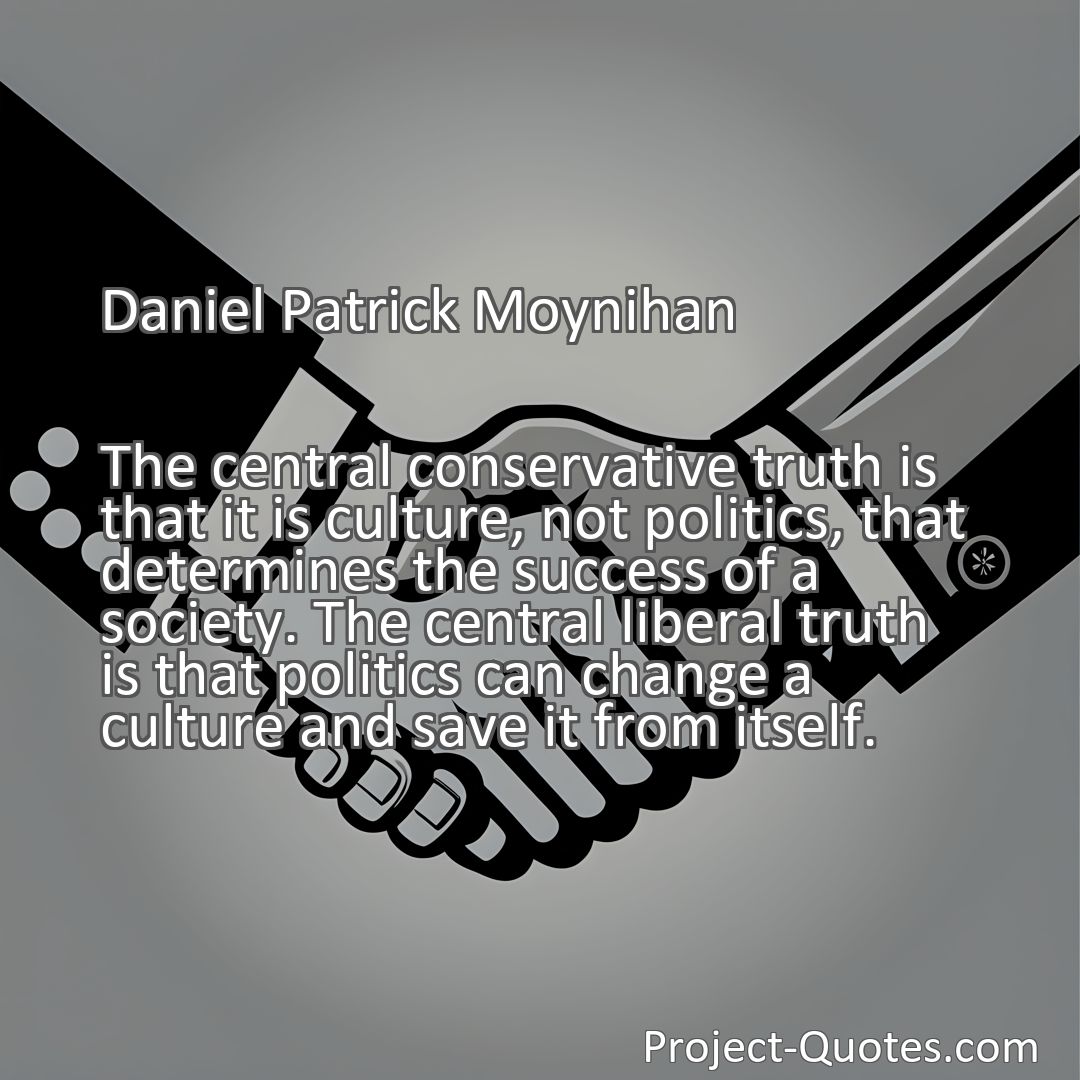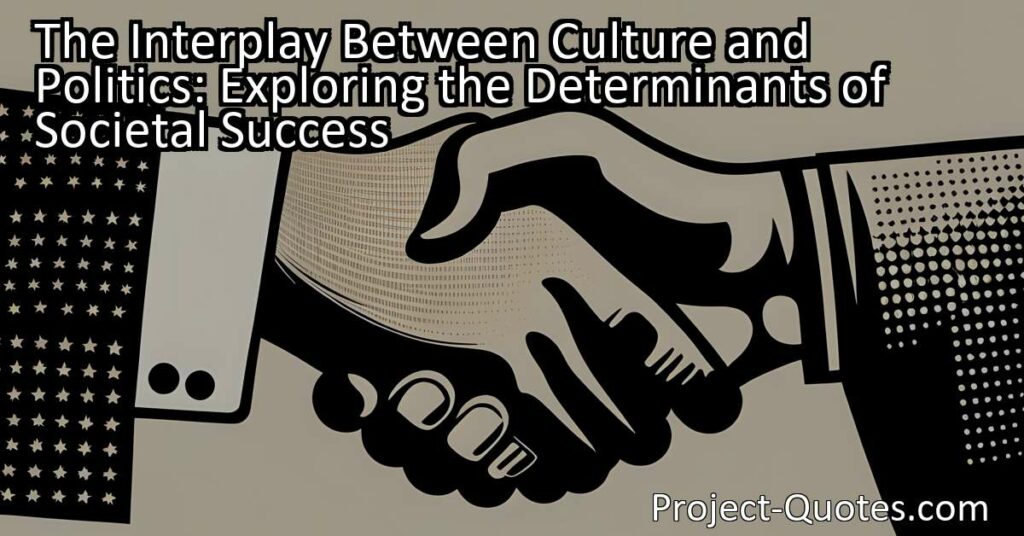The central conservative truth is that it is culture, not politics, that determines the success of a society. The central liberal truth is that politics can change a culture and save it from itself.
Daniel Patrick Moynihan
The interplay between culture and politics is essential for understanding how societies evolve and progress. Culture acts as the fundamental driver of a society’s success or failure, while politics has the power to influence and transform culture. Recognizing the symbiotic relationship between culture and politics is crucial in shaping societal change.
Table of Contents
- 1 The central conservative truth is that it is culture, not politics, that determines the success of a society. The central liberal truth is that politics can change a culture and save it from itself.
- 2 Daniel Patrick Moynihan
- 3 Meaning of Quote – The central conservative truth is that it is culture, not politics, that determines the success of a society. The central liberal truth is that politics can change a culture and save it from itself.
- 4 Freely Shareable Quote Image
- 5 Related
Meaning of Quote – The central conservative truth is that it is culture, not politics, that determines the success of a society. The central liberal truth is that politics can change a culture and save it from itself.
Culture and politics have always been hot topics of discussion and debate. People often wonder what truly shapes a society and brings about success. Some say it’s the political system, while others argue that it’s the cultural values and beliefs of a society. In the end, both sides have a point, but they approach the issue from different angles. The central conservative truth is that it is culture, not politics, that determines the success of a society. On the other hand, the central liberal truth is that politics can change a culture and save it from itself. Let’s delve deeper into these ideas and explore the different ways culture and politics interplay in shaping societies.
The central conservative truth suggests that culture is the fundamental driver of a society’s success or failure. Culture encompasses the values, traditions, customs, and beliefs of a particular group. It affects the way people think, behave, and interact with one another. When a society has a strong cultural foundation, it often thrives and prospers. The conservative argument stems from the belief that politics alone cannot guarantee the success of a society if its culture is weak or misguided.
For example, in many tribal societies, cultural values such as communal living, shared responsibilities, and respect for elders contribute to their overall well-being. These cultural traits promote cooperation, unity, and stability within the community. Consequently, these societies flourish despite having limited political structures, or sometimes even in the absence of any formal government.
In contrast, when a society’s culture lacks cohesion or promotes negative values such as corruption or discrimination, it can hinder progress and impede societal growth. Politics alone cannot rectify deep-rooted cultural issues that undermine a society’s well-being. In such cases, conservatives argue that focusing on addressing cultural deficiencies should be the priority rather than relying solely on politics to bring about change.
However, the central liberal truth counters this conservative stance by asserting that politics has the power to influence and transform a society’s culture. Liberals believe that political decisions can shape cultural norms, promote inclusivity, and rectify systemic inequalities. They argue that politics and governance play a vital role in creating an environment conducive to societal success.
Historical examples demonstrate the impact of politics on culture. In the mid-20th century, the civil rights movement in the United States led to significant political and legal reforms aimed at ending racial discrimination. Through the enactment of legislation like the Civil Rights Act of 1964, political forces propelled the nation on a path towards cultural transformation. Segregation and discrimination based on race were challenged, and more inclusive cultural values began to take hold.
Similarly, political movements advocating for gender equality have played a crucial role in reshaping cultural norms and challenging traditional gender roles. The political activism of suffragettes paved the way for women’s right to vote, which not only marked a political milestone but also challenged deeply ingrained cultural beliefs about women’s roles in society.
Moreover, political leaders who champion progressive ideas can bring about transformative changes in a society’s culture. Nelson Mandela’s fight against apartheid in South Africa is a prominent example of how political leadership can drive societal transformation. Mandela’s political activism and subsequent presidency dismantled the institutionalized racism and bigotry of apartheid, leading to a cultural paradigm shift towards inclusivity and reconciliation.
In essence, the central liberal truth acknowledges that politics can act as a catalyst for cultural change. By addressing social injustices, enacting laws, and promoting inclusive policies, politics can create the conditions necessary for a society to thrive.
It is important to note that culture and politics are not mutually exclusive. Instead, they are deeply interconnected and influence one another in a cyclical manner. While conservatives emphasize the primacy of culture in shaping society, liberals recognize that cultural norms and values can also influence political action. The relationship between culture and politics is symbiotic, each impacting and shaping the other.
To illustrate this point, let’s consider the current debate surrounding climate change. The cultural values of a society greatly influence its political response to environmental issues. Societies that prioritize economic growth and consumerism may be resistant to implementing policies aimed at environmental preservation. In contrast, cultures that value sustainability and conservation are more likely to support political actions such as renewable energy initiatives or stricter environmental regulations.
Conversely, political decisions can also shape cultural attitudes towards environmental stewardship. Through educational campaigns, public discourse, and legislative action, politics has the power to shift cultural norms and encourage environmentally responsible behaviors. This interplay between culture and politics reveals the symbiotic relationship between the two and highlights the potential for transformative change.
In conclusion, the central conservative truth highlights the significant role that culture plays in determining a society’s success. It argues that a strong cultural foundation is essential for societal well-being. On the other hand, the central liberal truth acknowledges that politics has the power to both influence and transform culture. By enacting laws, addressing social injustices, and promoting inclusive policies, politics can shape cultural norms and drive societal change. Ultimately, the interplay between culture and politics is complex and mutually reinforcing. Recognizing the importance of both elements is crucial in understanding how societies evolve and progress.
I hope this quote inspired image brings you hope and peace. Share it with someone who needs it today!


